News & Media
Transforming global goals into local actions
On 29 November 2019, Unisa hosted its Sustainable Development Goals (SDGs) Indaba at Senate Hall, Winnie-Madikizela Building - an event that addressed the implementation of 17 life-changing goals and the need to consolidate efforts in driving the spirit of Agenda 2030.
The Indaba saw the launch of two books: The Green Building Evolution and Sustainable Development Goals and Institutions of Higher Education, co-edited by Unisa’s Prof Godwell Nhamo, Chief Researcher and Exxaro Chair in Business Climate Change, and Dr Vuyo Mjimba from the Human Sciences Research Council (HSRC), Department: African Institute of South Africa.
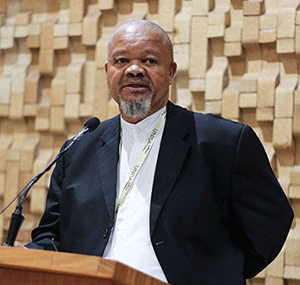
Prof Mandla Makhanya, Unisa Principal and Vice-Chancellor
In his opening and welcome address, Unisa's Principal and Vice-Chancellor, Prof Mandla Makhanya recalled the United Nations Development Programme’s perspective on the localisation of the Sustainable Development Goals and energies that flagged around them in January 2016. "World leaders set out an ambitious path to fight poverty, social injustice and other challenges experienced by many states around the globe," he said.
As a United Nations' global development network, the United Nations Development Programme advocates for transformation and connects countries to knowledge, experience and resources to support people in building better lives for themselves.
According to Prof Makhanya, it is crucial for the university to align its academic programmes with the implementation of SDGs in response to the 2063 agenda so "that we are not left behind and remain relevant to society" he advised.
Paying attention to the 4th SDG on Education, where the wish is for everyone to have access to inclusive, equitable, quality education, Prof Makhanya highlighted the importance of tertiary education in enhancing opportunities to address challenges pointed out by the UN’s Global Goals’ intention to end poverty, protect the planet and ensure prosperity for everyone by 2030.
Regarding the Higher Education context, Makhanya advised Unisa as a pioneer of the Open Educational Resources (OERs) project to take advantage of the opportunity to ensure that all the work supports the achievement of these goals and enhances programmes that are already underway to make education freely accessible in an Open Distance e-Learning (ODeL) space.
During the Indaba, Prof Cheryl Hendricks, Executive Director of the African Institute of South Africa (AISA) from the Human Sciences Research Council (HSRC) delivered a speech in absentia, emphasising that Unisa is at the forefront of institutionalising SDGs. Her speech referred to Africa’s motto that "no one should be left behind", and this was said to re-emphasise that these aspirational goals should be real to communities and society at large. In championing the Indaba, Hendricks said that this was the essence of the "Thuma Mina" spirit, since leaving no one to fall behind, was a need today.
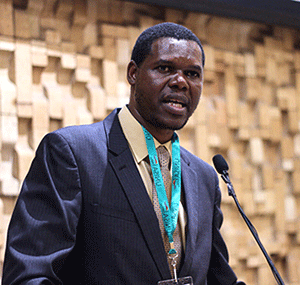
Prof Godwell Nhamo, Chief Researcher and Exxaro Chair in Business Climate Change
To put principles into practice, Prof Godwell Nhamo shared the history of how his book and the SDGs project started at Unisa. "Academics have a role to play in Higher Education to turn Agenda 2030 from a global vision into a local reality."
With Agenda 2030 being all-inclusive, Nhamo mentioned that the university is partnering with various stakeholders to support the SDG localisation process. In addition, he invited academics and individuals to join the project to integrate individual and collective needs, which are critical in implementing and realising global accords.
The event was followed by a panel discussion that deliberated on the importance of leadership in an academic environment, education as a public good, equity, and cultural justice to localise SDGs for a better future for all.
* By Lesego Ravhudzulo, Journalist, Department of Institutional Advancement
Publish date: 2019-12-04 00:00:00.0

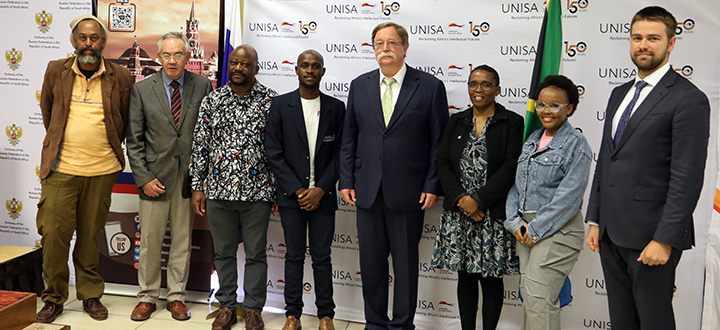 Unisa's student leadership engage with Russian ambassador
Unisa's student leadership engage with Russian ambassador
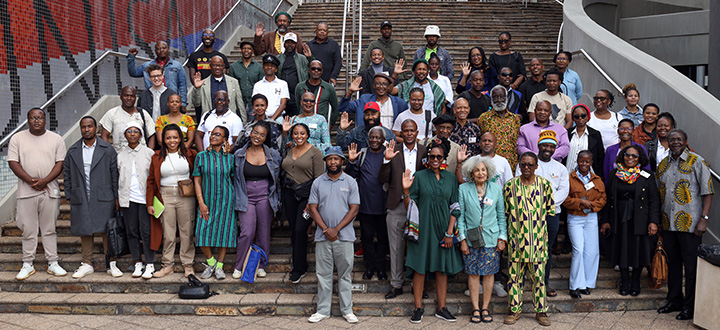 Re-igniting and re-imagining Pan Africanism, Afrocentricity and Afrofuturism in the 21st century
Re-igniting and re-imagining Pan Africanism, Afrocentricity and Afrofuturism in the 21st century
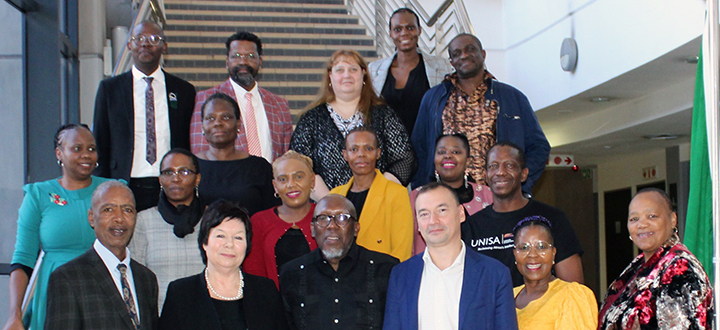 Unisa and Russian State University for the Humanities explore collaborative opportunities
Unisa and Russian State University for the Humanities explore collaborative opportunities
 Young Unisa science stars join elite Lindau Nobel Laureate group
Young Unisa science stars join elite Lindau Nobel Laureate group
 Education MEC addresses Unisa autism seminar
Education MEC addresses Unisa autism seminar